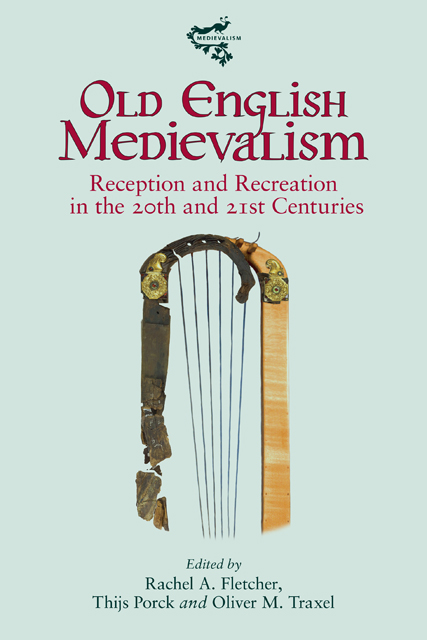Book contents
- Frontmatter
- Contents
- List of Illustrations
- List of Contributors
- Acknowledgements
- List of Abbreviations
- Early Medieval English in the Modern Age: An Introduction to Old English Medievalism
- I Reinventing, Reimagining and Recontextualizing Old English Poetry
- II Invoking Early Medieval England and Its Language in Historical Fiction
- III Translating and Composing in Neo-Old English
- IV Approaching Old English and Neo-Old English in the Classroom
- Bibliography
- Index
- Medievalism
11 - The Fall of the King and the Composition of Neo-Old English Verse
Published online by Cambridge University Press: 17 December 2022
- Frontmatter
- Contents
- List of Illustrations
- List of Contributors
- Acknowledgements
- List of Abbreviations
- Early Medieval English in the Modern Age: An Introduction to Old English Medievalism
- I Reinventing, Reimagining and Recontextualizing Old English Poetry
- II Invoking Early Medieval England and Its Language in Historical Fiction
- III Translating and Composing in Neo-Old English
- IV Approaching Old English and Neo-Old English in the Classroom
- Bibliography
- Index
- Medievalism
Summary
In his famous essay on ‘The Alliterative Metre’, C. S. Lewis memorably declared: ‘A man who preaches a metre must sooner or later risk his case by showing a specimen’. The number of my public writings on the technicalities of Old English verse composition is now considerable (others would no doubt prefer to call it excessive), and so I believe it is time for me to risk my case and present The Fall of the King, my most serious attempt so far at composing neo-Old English verse. This ninety-eight-line poem in Old English retells in classical metre and idiom King Théoden’s death at the Battle of the Pelennor Fields and the encounter between Éowyn and the Witch-king of Angmar as narrated in The Return of the King. My poem is thus a tribute to J. R. R. Tolkien, who has been described as ‘one of the most prominent composers of neo-Old English’. I would like it to be read as the manuscript copy of the lay that a bard from Rohan (an individual with a learned mind and a gentle heart) composed after the War of the Ring upon realizing that the enemy that Théoden dared to confront was of a more evil nature than his lord could ever have suspected. The publication of The Fall of the King, it is to be hoped, will encourage others to try their hand at the noble art of Old English versification. Before showing my poem and discussing verse composition, however, a few words are in order about the value of this creative activity for students and scholars of Old English poetry.
Latin verse composition has traditionally been seen by many as a central component of classical education. After a decline in popularity that started in the second half of the twentieth century, it is now experiencing a resurgence among teachers of Latin, thanks in part to the notable success of the active Latin movement. That this should be the case is hardly surprising. Experience tells us (and in this receives ample support from numerous studies in the field of second-language acquisition) that learners learn best through creative interaction with their objects of study. The beneficial effects that verse-making has had on generations of students of Latin poetry are well-known and have been discussed elsewhere.
- Type
- Chapter
- Information
- Old English MedievalismReception and Recreation in the 20th and 21st Centuries, pp. 209 - 222Publisher: Boydell & BrewerPrint publication year: 2022



